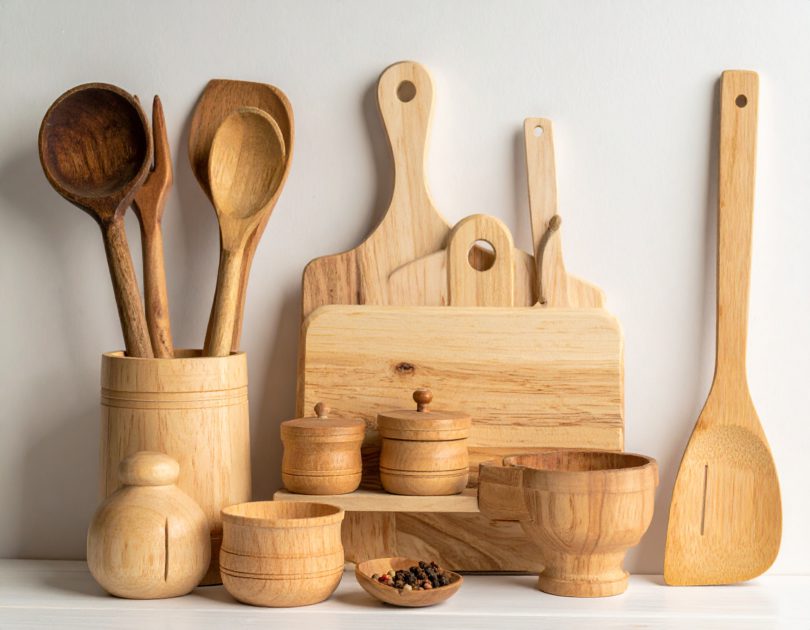There’s something deeply satisfying about cooking with wooden tools. A smooth beech spoon stirring soup, an olive wood board displaying fresh bread and cheese, or a walnut spatula flipping pancakes feels timeless compared to plastic gadgets. They’re durable, beautiful, and kinder to the planet. But here’s the catch: without proper care, wooden kitchen tools can quickly lose their charm, warp, or even crack.
The good news? With a few simple habits, you can keep your wooden utensils looking gorgeous and working perfectly for years. I’ve spoken with woodworking experts and kitchen pros, and here’s a complete guide to help you make the most of your natural tools.
1. Choosing the Right Wood
Not all woods are created equal in the kitchen. The best utensils come from hardwoods—tight-grained woods that resist stains and knife grooves.
“Beech, maple, and walnut are fantastic choices,” says Chris Holland, a furniture maker who has been crafting with hardwoods for decades. “They hold up beautifully under daily use because their grain structure keeps out moisture and dirt.”
Olive wood is another favorite for its rich, swirling patterns and natural oils. It’s stunning on the countertop, but Holland notes that it can be a little harsh on knives. Ash, a pale, lightweight wood, is strong too, though its open grain means it needs regular oiling to stay in shape.
When buying, look for sustainably sourced woods that are labeled as food-safe. Avoid softwoods like pine—they dent easily and can absorb odors.
2. Skip the Dishwasher
If you only remember one rule, let it be this: never put wooden tools in the dishwasher. The combination of hot water, detergent, and high heat is a recipe for disaster.
“The dishwasher strips away protective oils immediately,” Holland explains. “The steam forces water into the wood, causing swelling, warping, and eventually cracks.”
Instead, wash wooden tools by hand with warm water and mild soap. Skip harsh scrubbing pads. Dry them right away with a towel rather than leaving them to air-dry in a damp sink.
For lingering smells—like garlic or onions—rub the surface with a cut lemon before washing. Jo Hadlow-Davies, a kitchen consultant, swears by this simple trick to neutralize odors naturally.
3. Store with Care
How you store wooden tools matters almost as much as how you wash them. Cutting boards should always be stored on their edge, not flat, to prevent moisture from getting trapped underneath. Wooden spoons, spatulas, and whisks do best stored upright in a utensil holder, where air can circulate freely.
The one thing to avoid? Leaving them sitting in standing water. Even a few hours can cause swelling or permanent damage.
4. Nourish the Wood
Over time, wood loses its smooth finish and can start to feel dry or rough. Regular oiling keeps utensils protected and looking their best. The key is to use food-safe oils—products that won’t go rancid or interfere with food flavors.
Hadlow-Davies suggests olive oil for tools you wash daily, though she warns it can eventually turn rancid if not refreshed often. For longer-lasting protection, experts recommend mineral oil, linseed oil, or tung oil. These penetrate deeply and resist moisture.
Holland’s go-to routine? “Every month or so, give your boards and spoons a light sanding with fine-grit paper, then apply a thin coat of food-safe oil with a cloth. Let it soak in and dry fully before using again.”
Other popular options include:
- Danish oil: A blend of natural oils that’s easy to apply and quick to dry.
- Beeswax: Rubbed in with a soft cloth, it leaves a silky finish and subtle shine.
- Osmo products: Designed for woodwork, they’re food-safe and long-lasting, though they take longer to dry.
5. Know When to Let Go
Even the best-loved utensils don’t last forever. A cracked board or deeply split spoon isn’t safe to use, since bacteria can hide in the crevices. But don’t just toss them in the bin—repurposing is always an option.
Old boards can become garden markers or serving trays for non-food items. Worn spoons make quirky plant stakes or decorative wall hooks. When an item really can’t be salvaged, recycle or compost it if possible, and replace it with a sustainably sourced alternative.
Why It’s Worth the Effort
Taking care of wooden tools may seem like extra work compared to tossing plastic utensils in the dishwasher, but the payoff is huge. Not only will they last for years, but they’ll also add warmth and craftsmanship to your kitchen routine.
There’s a rhythm to it too: washing by hand, sanding occasionally, oiling once a month. These little rituals help you slow down in a fast-paced world—and that’s part of the charm.
As Holland puts it: “When you care for wood properly, it gives back. It lasts, it ages beautifully, and it becomes part of your kitchen’s story.”
So next time you reach for your beech spoon or walnut cutting board, remember: a little care goes a long way. And in the process, you’re not just preserving utensils—you’re honoring the craft of making and the joy of cooking.

